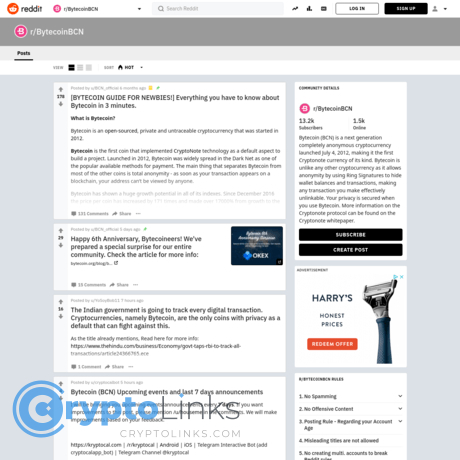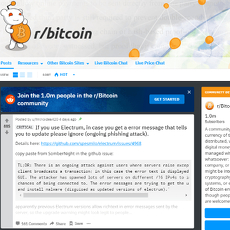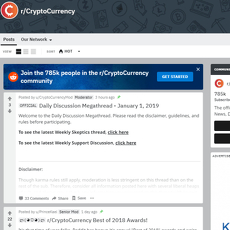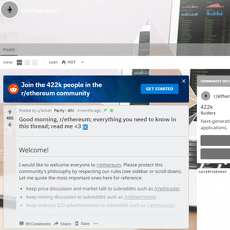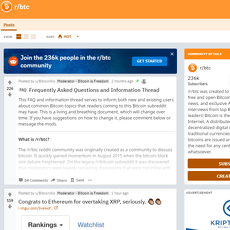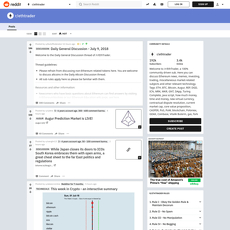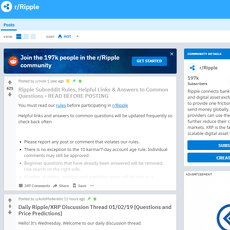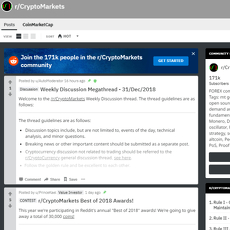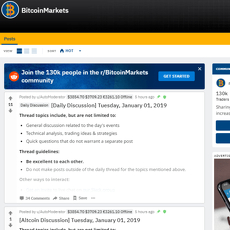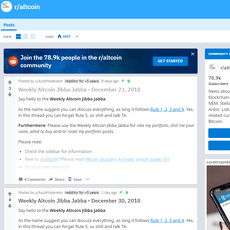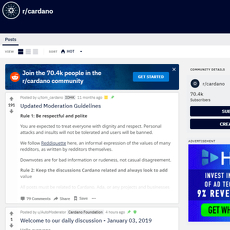r/BytecoinBCN Review
r/BytecoinBCN
www.reddit.com
r/BytecoinBCN Review Guide: Is the Bytecoin Subreddit Still Worth Your Time? (Tips, Tools, FAQ)
Still checking r/BytecoinBCN for answers and wondering if it’s signal or noise? If you hold BCN, you’re researching Bytecoin’s history, or you just want to take the community’s temperature without wasting hours, you’re in the right place.
I live inside crypto forums and tools every day—Reddit included. The trick isn’t “Is this subreddit good or bad?” It’s: What can I realistically get from it, how do I avoid traps, and where do I verify what I read? That’s the entire point of this guide.
Why Bytecoin threads can be frustrating (and how to avoid the time sinks)
Bytecoin is an older privacy-focused project. That comes with benefits (long history, lots of archived context) and headaches (outdated info, low-activity cycles, and echo-chamber price chatter). Here are the common pain points I see when people land on r/BytecoinBCN:
- Scattered info, repeated questions: The same “Is BCN dead?” or “Wallet not syncing” posts resurface every few months.
- Price talk that lags reality: Screenshots and hot takes often trail live data, especially in low-liquidity markets.
- Hype vs history: Threads mix recycled narratives with real updates, making it hard for newer readers to sort what’s current.
- BCN vs BTC confusion: People blur tech, goals, and adoption with straight-up price comparisons.
- Trust gap on Reddit: You’ll see bold claims with no links. That’s not unique to Bytecoin—research from Science (2018) found false news spreads faster than truth on social media, especially when it triggers emotion.
Typical thread examples you’ll see:
“My old Bytecoin wallet won’t sync—any fix that still works in 2025?”
“New listing when?” / “Did exchange X delist BCN?”
“BCN to $0.01 soon?” (no links, lots of debate)
If any of that sounds familiar, good—you’re already ahead of the curve by expecting it.
What I’ll help you do (fast)
I’ll show you how to read the Bytecoin subreddit like a pro. That means:
- Spot signals fast: Which posts are worth your time, and which aren’t.
- Trust smart, verify smarter: Fact-check claims with live data sources (e.g., CoinGecko’s Bytecoin page for price, market cap, liquidity; BCN-to-BTC conversions for context).
- Separate tech from hopium: Understand BCN’s legacy and what that means for today’s market conversations.
- Use predictions as models, not promises: Treat pages like MEXC’s Bytecoin price prediction as scenario planning—not signals to FOMO.
What you’ll get in this guide
- A clear overview of the subreddit: What it’s for, who uses it, and the kind of posts that actually help.
- How to spot quality threads: Look for sources, dates, counterpoints in comments, and technical details that can be verified.
- Where to check numbers: Use live trackers (price, volume, spreads, listings) before you trust any screenshot or claim.
- How to ask better questions: A simple format that gets useful answers faster and cuts the “did you try Google?” replies.
- BCN vs BTC done right: When to use subreddit sentiment for color—and when to switch to raw conversion data and market benchmarks.
- FAQ you can actually use: Straight answers with links you can click and verify yourself.
To keep this tight and practical, I’ll use real examples you’ll recognize:
- Price claims on Reddit: Cross-check with CoinGecko and look at exchange pairs and volume before believing a headline number.
- BCN vs BTC arguments: Pull up a live conversion, then read the thread again with numbers in hand.
- Future talk: Skim community sentiment, note assumptions, then compare against any on-chain, dev, or listing updates. Treat prediction pages as models—not guarantees.
No fluff and no hopium. Just a simple workflow to save your time and protect your stack.
Ready to get real about what r/BytecoinBCN is actually good for—its purpose, vibe, and what to expect before you post or lurk? Let’s start there next so you can read the sub like an insider instead of guessing.
What is r/BytecoinBCN? Purpose, vibe, and what to expect
Think of r/BytecoinBCN as a small clubhouse for people who still track Bytecoin (BCN) and anyone curious about its history. It’s where old threads meet new questions, where a single comment can save you hours of troubleshooting, and where long-time holders still watch for signs of life. Expect practical talk when it happens, a lot of historical context, and the occasional burst of price chatter when news breaks.
“In crypto, screenshots are not sources.”
The vibe is steady and skeptical. You’ll see long-time users ask for proofs, links, and dates. That’s a good thing. It keeps discussions grounded, especially for a legacy privacy coin with a complex past.
What shows up most often:
- News sharing: listings/delistings, wallet updates, or community notices.
- Dev chatter (when present): sporadic mentions of repositories, releases, or maintenance notes.
- History and context: throwbacks to early CryptoNote days, forks, and exchange incidents.
- Price talk: usually reactive, sometimes nostalgic, often mixed with caution.
- Q&A: wallet sync issues, old coins recovery, exchange withdrawal questions.
If you’re expecting a firehose of daily posts, this isn’t that. It’s a niche sub that becomes invaluable when you’re researching something specific or trying to make sense of BCN’s past and present.
Subreddit basics: member count, activity, and post types
It’s a smaller, legacy coin subreddit. Activity is bursty: quiet stretches, then clusters of threads when a news item or wallet issue surfaces. At the moment, I typically see new posts arrive weekly and discussions pick up within a day or two when the topic hits a nerve (think wallet bugs, exchange outages, or chain quirks).
Common post formats you’ll run into:
- News links: short headlines pointing to an article, exchange notice, or GitHub issue.
- Troubleshooting: “Wallet won’t sync,” “Can’t send,” “Node connection failing,” “Importing old keys.”
- Exchange questions: “Where can I trade BCN now?” “Why is my withdrawal pending?”
- Price threads: “Any catalysts?” “What happened today?” Occasionally with historical charts.
- Meta/community: clarifying rules, pointing to docs, or requesting stickies.
Time-savers to check every visit:
- Sidebar: member count, rules, and links to official resources often live here.
- Stickies or megathreads: when available, these collect FAQs, wallet notes, or hot topics so you don’t chase 20 scattered comments.
- Flairs: look for flairs like “News,” “Question,” or “Discussion.” They help you scan faster and skip what you don’t need.
Quick note on expectations: smaller subs tend to be more hands-on and practical, but they’re not a breaking-news service. Use it for depth and context; confirm fast-moving info with live data sources.
A quick Bytecoin background (so the threads make sense)
Bytecoin is one of the earliest privacy coins, launched in 2012 as the first implementation of the CryptoNote protocol (ring signatures, stealth addresses, and transaction obfuscation). If you’ve heard of Monero (XMR), you’ve already brushed up against this history—Monero forked from Bytecoin in 2014 amid concerns about early distribution. That backstory explains a lot of the tone you’ll see on the subreddit: cautious, technical, and not easily swayed by hype.
Why this matters for your reading:
- Privacy-first lineage: threads often focus on protocol mechanics and wallet behavior, not just price.
- Legacy debates: premine/distribution arguments and governance critiques still surface; older users know the details.
- Liquidity and listings: because BCN is a legacy asset, exchange support and spreads can shift; you’ll see posts tracking where it’s actually tradable.
If a comment sounds skeptical of shiny promises, that’s part of the culture shaped by years of hard lessons.
How it compares to larger crypto subs
A niche coin sub like r/BytecoinBCN is about depth and continuity. It’s where you’ll find people who’ve seen the cycles, stored dusty wallets, and remember which exchanges broke withdrawals in 2018. Bigger hubs—like r/CryptoCurrency and the “top subreddit” roundups you’ll see in industry lists—excel at breadth and speed. They surface market-wide news, regulatory shifts, macro sentiment, and major exchange stories fast.
- Use r/BytecoinBCN for: BCN-specific history, wallet fixes, chain quirks, and context you won’t get elsewhere.
- Use larger subs for: market-wide catalysts, learning how broader crypto narratives might affect older privacy coins, and spotting cross-asset trends.
There’s also a practical trade-off. Smaller communities tend to give more thoughtful replies and less performative noise. Bigger subs move fast, but signal is mixed with memes, momentum chatter, and hot takes. If you’re troubleshooting or chasing real context, the BCN sub often gets you there faster—especially when paired with data checks you’ll see later in this guide.
One last thing before we go further: when a post looks confident but light on sources, would you know in under 10 seconds if it’s worth your time? Up next, I’ll show you the exact filters I use to separate signal from noise—so you don’t waste a minute.
Content quality and moderation: separating signal from noise
If you’ve ever lost 15 minutes to a thread that said everything and proved nothing, you know why this matters. On a legacy coin subreddit, the signal is there—but you need a filter that cuts hype, timestamps claims, and shows you what’s actually useful. I run a quick, repeatable process so I never waste time.
“Extraordinary claims require extraordinary evidence.” — Carl Sagan
That line has saved me from more bad trades and false alarms than any indicator on a chart. Keep it close while you browse.
Post and comment quality: what’s worth your attention
I look for repeatable patterns. Good posts look and feel different from hype posts. Here’s how I tell, with real-world style examples you’ll recognize.
- Green flags (read these first):
- Primary sources: links to the project’s official site, a verified GitHub release, or an exchange’s announcement page.
- Fresh timestamps: the post references dates within the last week and shows versions, block heights, or commit hashes.
- Specifics over slogans: changelogs, reproducible steps, transaction IDs, and screenshots with visible dates.
- Constructive comments: replies add data, counterpoints, or fixes—not just emojis and cheerleading.
- Cross-references: the OP or top comments link corroborating sources (block explorers, tracker pages, official social feeds).
- Red flags (skip or treat as unverified until proven otherwise):
- “Guaranteed,” “last chance,” “100x soon,” or any countdown clock vibe.
- Link shorteners, referral codes, or a push to join off-platform groups to “get details.”
- No sources, old screenshots, or images with cropped timestamps.
- Brand-new accounts posting sensational claims or price targets with no method.
Examples and how I triage:
- “New BCN wallet 1.3.7 released — here’s what changed”
- What I check: does it link to an official GitHub release page with a signed tag? Is there a changelog and matching version number on the project site?
- Why it matters: concrete versioning and hashes are hard to fake. If comments include install notes or bug confirmations, that’s high-quality signal.
- “BCN relisting on Exchange X next week”
- What I check: the exchange’s announcements page, official X/Twitter, and a reputable tracker’s markets tab to see if a pair actually appears with volume.
- Watch out: if the only “source” is a screenshot of a DM or a Telegram post, it’s a no.
- “Help: wallet stuck at block 1,847,xxx—any fix?”
- What I check: comments that share exact steps (re-sync from height X, update peers, verify config), links to known issues, or block explorer confirmations.
- Why it matters: practical solutions and verifiable steps are gold for troubleshooting threads.
- “Why BCN will flip BTC”
- What I check: methodology. If there’s no framework (adoption metrics, liquidity, dev activity), it’s entertainment, not information.
One more reason to be picky: peer-reviewed work shows false claims travel faster than truth on social platforms. In a large-scale study, false news spread “farther, faster, deeper, and more broadly” than true news online (Science, 2018). That’s your cue to slow down when a thread feels too exciting.
Rules, flairs, and stickies that matter
Strong moderation leaves footprints. You’ll see clear rules, sticky posts that age well, and flairs that route conversations to the right places. Here’s how I use them without guessing:
- Read the “About” → Rules: check policies on price talk, referral links, low-effort posts, and off-topic content. If rules are specific, enforcement is usually better.
- Scan stickies first: FAQs, megathreads, and update hubs often concentrate the best answers. If a breaking item isn’t stickied or linked there, I assume it’s unconfirmed.
- Filter by flair: use flairs like News, Dev, or Question (if available) to focus. Searching flair:News or flair:Dev narrows noise fast.
- Look for mod presence: removal notes, Automoderator comments, and mod stickies suggest rules aren’t just decorative. Communities with visible moderation tend to reduce low-quality and harmful content (ACM, 2017).
- Sort smart: “Top” + “This month” is my default to find posts that earned engagement for substance, not drama.
Small tip with a big payoff: if a post was removed by moderators, ask why in the comments or check the rules—patterns of removals often reveal the community’s quality bar.
Signal-to-noise checklist
Here’s the quick scan I use. It takes 30–90 seconds and saves hours.
- Who: Is the poster an active account with a history in BCN topics? Any obvious conflict (referral links, shilling)?
- What: Primary source linked? Version numbers, block heights, tx IDs, or other verifiable markers?
- When: Is the info dated within the last week? Screenshots with visible timestamps?
- Where else: At least two independent confirmations (official site/social, exchange announcement page, reputable data tracker)?
- How solid: Are there constructive counterpoints in the comments? Healthy skepticism is a green flag.
- Numbers check: If it’s market-related, are there metrics (volume, spreads, listing pairs) instead of pure predictions?
- Language: Urgency, countdowns, or “guaranteed” = likely manipulation. Academic work on crypto pump-and-dump schemes shows hype spikes around thin-liquidity windows (SSRN, 2021).
- Actionable: After reading, do you know exactly what to verify next? If not, it’s probably fluff.
- Archive and compare: Save the link (archive) and re-check in 24 hours. Real news ages well; rumors evaporate.
I keep this filter on every time I browse. Want to see how it turns “noise” into answers for the questions everyone asks—future outlook, BCN vs BTC, and live pricing that actually matches the market? Let’s put it to work next. What’s the one claim you wish you could verify in under two minutes?
Using r/BytecoinBCN to answer the big questions people ask
Reddit won’t hand you certainty, but it will show you what the crowd is watching. That’s useful—as long as you treat the subreddit as a signal and confirm the details elsewhere. Here’s how I use r/BytecoinBCN to tackle the questions everyone keeps asking, without getting trapped in stale threads or wishful thinking.
“Trust data. Listen to people. Commit to neither.”
“What is the future of Bytecoin?”
Future talk in r/BytecoinBCN swings between loyal optimism and “is it over?” posts. I read both—but I separate narrative from evidence. Here’s a simple way to do that.
- Scan sentiment threads, then filter for proof. Open recent “future” or “roadmap” posts and sort by Top or New. Flag comments that include sources (dev notes, release links, exchange notices). Ignore comments with no links and dramatic language.
- Cross-check forecasts with model pages, not with hope. If someone cites a price target, compare the tone with model-based pages like MEXC’s Bytecoin (BCN) Price Prediction. They publish scenario numbers through future years—treat them as models, not promises.
- Match narrative to real activity. If a thread claims “devs are building again,” look for corroboration: official blog, GitHub commits, release notes, or explorers showing network activity. No hard links? Park it in the “maybe” bucket.
- Check liquidity health. A “future” without liquidity has a ceiling. Use CoinGecko’s Bytecoin page to check the Markets tab, volumes, and spreads. Thin books = higher risk that any news barely moves price—or moves it too violently.
Why this works: independent research has repeatedly shown that social sentiment can correlate with short-term moves, but the effect is noisy and fades fast. In other words, sentiment can spark interest, but structure (listings, liquidity, shipping updates) sustains it. If a bullish thread has no data backbone, it’s just a mood.
Quick reality test you can run in under 60 seconds:
- Does the optimistic claim link to an official source?
- Do volumes and spreads on CoinGecko support the idea that new demand can actually fill?
- Are there counterpoints in the comments with credible links? If not, you’re probably reading an echo chamber.
“How does Bytecoin compare to Bitcoin?”
Reddit debates here usually mix apples and oranges—tech values vs price action. I separate them so I’m not arguing past the facts.
- Tech and mission:Bitcoin is the market benchmark and settlement layer with the deepest liquidity. Bytecoin is a legacy privacy-focused coin with a long history and a different goal set. Different jobs, different adoption.
- Adoption and liquidity: BTC has near-universal listings, institutional access, and deep derivatives markets. BCN tends to have niche listings and thinner books. That gap matters more than any single feature comparison.
- Hard numbers, not vibes: For a clean price lens, open CoinGecko’s BCN page and switch the converter to BTC to see BCN → BTC in real time. Now you’re talking data, not opinions.
When a comment says “BCN could catch up to BTC because [feature],” I do three quick checks:
- Conversion reality check: What’s the current BCN/BTC rate on CoinGecko? Has it strengthened or weakened over 30–90 days?
- Market structure: Are there multiple liquid markets for BCN with tight spreads? If not, even good news struggles to translate into lasting price moves.
- Evidence of usage: Are there recent posts linking to real-world usage or integrations, not just talk? If the sub can’t surface one, that’s telling.
Use the subreddit to hear how holders frame the mission. Use conversion tools and market data to ground the comparison. Both matter—just not in the same way.
“How much is 1 Bytecoin worth right now?”
Reddit price posts are often hours late (or cherry-picked). I still read them for context, but I confirm the number and the tradeability off-platform.
- Get the live number: Check CoinGecko: Bytecoin (BCN) for USD price, market cap, 24h volume, and the quick converter.
- Look under the hood: Open the Markets tab. Note:
- Which exchanges actually list BCN today
- Spreads between bid/ask (wide spreads = expensive to enter/exit)
- Reported vs. normalized volume (watch out for suspicious spikes)
- Tradeability check: If a Redditor brags about a price, ask: Could you buy or sell a reasonable size without moving the market? Scan order-book depth. If not, that “price” is mostly theoretical.
- Listing news: If someone claims a new listing or delisting, verify on the exchange’s official announcements page or social account before you act.
Two sample use-cases I run into a lot:
- “Price pump incoming!” I check CoinGecko for volume confirmation. No volume + wide spread = pass. If volume’s rising across multiple markets and spreads are tightening, I’ll watch closer.
- “Price is dead.” Low volume might be true, but thin books also mean a small buyer can move price. I still confirm current pairs and whether any market maintenance or delistings explain the lull.
The emotional trap looks like this: one screenshot, one comment, one hunch. Resist it. When you anchor on a single post, you ignore the real question: “Is the price both accurate and executable right now?” That’s why the markets tab and spreads matter more than a headline number.
If you like turning chaotic threads into clean answers, the next step is where it gets fun. Want my exact search tricks, question template, and the verification loop I use so people actually reply with useful sources?
Getting real value from r/BytecoinBCN: how I research, ask, and verify
Reddit can be a goldmine or a rabbit hole. When I’m working through r/BytecoinBCN threads, my goal is simple: pull out real signals, confirm them with data, and leave a breadcrumb trail others can follow. That’s how you avoid FOMO traps and actually get answers that hold up a week later.
“Trust is good. Verification is better.”
Below is the exact workflow I use, with sample queries, question templates, and quick checks that catch most of the bad info before it wastes your time.
Search first: how to find past answers fast
If you ask before searching, you’ll get fewer responses and more “use the search bar” replies. I always sweep what’s already there first.
- Use Reddit’s filters: In r/BytecoinBCN, try sort = New for breaking issues (e.g., wallet outages), and sort = Top + time filter (Past year) for evergreen fixes and best guides.
- Targeted search on Reddit: Type a focus phrase into the sub’s search like:
- wallet stuck pending
- BCN node connection
- Bytecoin exchange delist
- BCN fork issue
- BCN to BTC fees
- Google it with operators: Use:
- site:reddit.com/r/BytecoinBCN “wallet” “stuck”
- site:reddit.com/r/BytecoinBCN “delisted”
- site:reddit.com/r/BytecoinBCN “price” “CoinGecko”
This pulls up threads the native search sometimes misses.
- Scan stickies and sidebars: If there’s a megathread or FAQ, read it. It often contains the exact wallet version or node endpoints the latest fixes rely on.
- Skim comments for sources fast: I open each promising thread, hit “Expand all,” and use the browser’s find (Ctrl/Cmd+F) for “http” or “source.” I’m hunting for links, not opinions.
Example: If I see three different posts claiming a “BCN delist,” I’ll:
- Check the post dates (old delists get recycled).
- Search site:reddit.com/r/BytecoinBCN “delist” and compare the stories.
- Flag anything with screenshots but no links (we’ll get to that shilling pattern below).
Ask better questions (and get better answers)
Great questions attract experts. Low-effort ones get silence. Here’s a template that consistently gets me useful replies.
Use this format:
- Context in one line: What are you trying to do? (e.g., move BCN from old desktop wallet to exchange)
- Environment: OS, wallet/app name + version, exchange, and region if it affects KYC.
- What you checked: Link the threads you read, tools you tried, and what happened.
- Evidence without secrets: Screenshots redacted, TX hash, block explorer URL, error message.
- Your goal: “I need to confirm if the transfer is stuck or just unconfirmed” beats “help pls.”
- Ask for sources: “If you’ve got a fix, can you add links to docs or an explorer?”
Good example (worth replying to):
Subject: Bytecoin desktop wallet 3.1 on Windows 11 shows pending for 3 hours — TX hash inside
Body: Trying to send 200k BCN from Wallet v3.1 to Exchange X. Node shows synced (height 2,xxx,xxx). I read these two threads and tried the rescan step: [link], [link]. TX hash: [link to explorer]. Error message: none, just “pending.” Is this a node issue or typical queue time? Any official node list I should switch to? Sources appreciated.
Bad example (people will skip it):
My coins are stuck help!!! Is BCN dead???
Pro tip: Edit your post with the final fix and mark it solved. People remember users who close the loop, and you’ll get faster help next time.
Spotting misinformation and shilling
Crypto forums attract hype and agendas. I treat every claim as unverified until it passes a few quick tests. A large peer‑reviewed study found false stories spread faster than true ones on social platforms, especially around finance and politics — so the odds aren’t in your favor if you don’t verify first.
Source: Science (Vosoughi, Roy, Aral, 2018)
Common red flags I see in r/BytecoinBCN:
- Brand-new accounts hyping an exchange or wallet with zero history in the sub.
- Bold price targets with no links, or “insider” tone: “BCN to 10x by Friday.”
- Out-of-date screenshots cropped to hide the URL bar or timestamp.
- Selective quoting of old dev posts treated like fresh updates.
- Low-effort pile-ons that repeat a rumor with slightly different wording.
My 60-second verification checklist:
- Dates first: Is the post or screenshot from this week? Use the post timestamp and reverse‑search the image if needed.
- Source link or it didn’t happen: If there’s no link, ask for one. If you get blocked or mocked, that’s your answer.
- Price and liquidity: Check a live tracker for BCN’s current price, market cap, volume, and markets. Look for:
- 24h volume trends and depth (thin books = big spreads)
- Actual exchange pairs carrying BCN today
- Listings/delistings: Confirm on the exchange’s official announcements or status page. If it’s real, they’ll post it.
- Transactions: For “stuck” claims, plug the TX hash into a block explorer. If there’s no hash, the claim is weak.
- User history: Click the profile. Are they only posting hype across multiple coin subs?
- Archive check: If a site is edited frequently, paste the URL into the Wayback Machine or archive.today to see earlier versions.
Example: “Exchange Y relisted BCN!”
- Ask for the announcement URL on Exchange Y’s blog or X account.
- Check the exchange’s Markets page — does BCN show up with pairs and active volume?
- Look for matching mentions on a reputable aggregator. No echo from credible sources usually means it’s noise.
- Search r/BytecoinBCN for the exchange name + “listing” to see prior history (fake or failed listings leave a trace).
Example: “Wallet bug fixed in the latest update”
- Is there a release note or repo tag with the version number?
- Does the fix mention a specific issue ID and steps to reproduce?
- Do other users confirm in the comments with system details that match yours?
One more thing I do without fail: if a claim could change my actions today (sell, buy, move funds), I require at least two independent sources. That rule alone has saved me from more mistakes than I care to admit.
If you want the exact tools and links I keep open while I do these checks — from official BCN references to price and listing trackers — shall we get your browser ready next?
Tools and resources to cross-check what you read on Reddit
Great communities can point you in the right direction. But when money is involved, I don’t trust any single comment—especially on low-liquidity, legacy coins. Here are the tools I keep open in another tab while reading r/BytecoinBCN, plus the exact checks I run so I’m not guessing.
Official and data sources to keep handy
When someone claims “BCN is pumping,” “new listing,” or “dev update coming,” I sanity-check with a short, reliable list:
- Official website: https://bytecoin.org — Look for blog posts, release notes, and links to all “official” socials in one place.
- Official X (Twitter): https://twitter.com/Bytecoin_BCN — Time-stamped announcements are gold when verifying exchange listings or wallet updates.
- GitHub: https://github.com/bytecoin — Recent commits or releases can back up any “dev is active” claims.
- Block explorer: https://explorer.bytecoin.org/ — Useful for seeing network activity, transaction counts, and whether the chain is moving normally.
- Price and conversions: CoinGecko: Bytecoin (BCN) — Check live price, market cap, volume, markets, and switch quote currency to BTC for quick BCN→BTC context.
- Model-based forecasts: MEXC: Bytecoin Price Prediction — Treat these as scenario models, not promises. Pair with any real updates you see on Reddit.
- Market-wide context: r/CryptoCurrency — Bigger macro threads help you see if BCN chatter lines up with broader sentiment. It’s one of the notable subs in LKI Consulting’s roundup of top crypto subreddits.
Why bother with all this? Because hype spreads faster than facts. One large study (Science, 2018) found false news spreads significantly farther and faster on social platforms than truth. Keep that in mind any time a comment sounds too confident without links.
Study: The spread of true and false news online (Vosoughi, Roy, Aral) — science.org/doi/10.1126/science.aap9559
Quick-check workflow for price, liquidity, and listings
Here’s the fast routine I use when a Reddit thread claims “BCN is moving” or “new exchange just listed BCN.” You can run it in 90 seconds:
- 1) Spot-check price and volume: Open CoinGecko: BCN, confirm the current price, 24h change, and 24h volume. If volume is tiny, any price candle can be misleading.
- 2) Open the Markets tab: Look at each exchange pair. Note real volume vs “reported,” and click through to the exchange. Wide bid–ask spreads (e.g., 2–8%) or thin order books mean higher slippage and harder exits. If you need a refresher on why spreads matter, skim this explainer.
- 3) Confirm listing/delisting: If someone says “Relisted on X,” check the exchange’s official X account and announcements page. If nothing shows up, it’s likely a rumor. Cross-check the project’s official X too.
- 4) Scan event calendars: Look for upcoming milestones on CoinMarketCal. If Reddit mentions a “major event tomorrow” and it’s not listed anywhere credible, be skeptical.
- 5) Reconcile with Reddit: Go back to the thread and see if anyone posted screenshots with dates, official links, or order-book shots. No sources = low signal.
- 6) Note the context: If Bitcoin is surging or dumping, BCN’s move might just be beta to BTC. Use the BTC quote toggle on CoinGecko to see if BCN is actually outperforming BTC or just riding the tide.
Real-world example: A user claims “BCN/USDT volume exploded.” On CoinGecko, you see a single exchange shows most of the volume. You click through; the order book is thin and the spread is 4%. That’s not healthy liquidity—it’s a warning that entry/exit costs could be high even if the chart looks green.
Resources to bookmark
- Bytecoin official site
- Bytecoin on X (Twitter)
- Bytecoin GitHub
- Bytecoin block explorer
- CoinGecko: Bytecoin (check Markets and switch quotes to BTC)
- MEXC: Bytecoin price prediction
- r/BytecoinBCN and r/CryptoCurrency
- LKI Consulting’s top crypto subreddits
- CoinMarketCal
- Bid–ask spread (Investopedia)
- False news spreads faster (Science, 2018)
- {{longresources}}
Next up, I’ll answer the question everyone asks but few verify properly: is Reddit actually a good source for crypto news—or just a sentiment scanner? Let’s settle that and make a clear call on r/BytecoinBCN in the final section.
FAQ, verdict, and next steps
If you’ve made it this far, you already know how to squeeze real value out of a small coin subreddit. Here’s the quick-hit FAQ I keep getting about r/BytecoinBCN, plus a clear verdict and what to do next.
Is Reddit a good source for crypto news?
It’s great for early signals and community context, not for final answers. I’ve seen issues surface on Reddit hours before official posts—things like exchange withdrawal hiccups or wallet quirks—but you still have to verify.
- Use Reddit for: sentiment, quick crowdsourced checks, pointing you toward sources you might have missed.
- Verify with: official channels, live data, and reputable aggregators.
Two helpful bits of evidence here:
- MIT/Science (2018) found false news spreads faster than truth on social platforms. Translation: never stop at the thread.
- Pew Research shows a huge share of people get news from social media, but trust varies a lot. Always add a second source.
For broad market coverage and timely meta-discussion, the big hub r/CryptoCurrency is worth a spot in your feed (it’s routinely featured in roundups like LKI Consulting’s list). For Bytecoin’s history, wallet quirks, and BCN-specific threads, r/BytecoinBCN is the right room.
How do I check BCN price and liquidity fast?
- Live price and market data: CoinGecko: Bytecoin (BCN)
- BCN to BTC conversions: BCN → BTC on CoinGecko
Look at the 24h volume, the exchanges/pairs listed, and spreads. Thin books can make a “headline price” meaningless if you can’t actually fill a reasonable order.
Are price predictions on Reddit worth anything?
Treat them like weather forecasts—useful for planning, not guarantees. If you want a public model to compare with community chatter, check MEXC’s Bytecoin price prediction. Then sanity-check it against recent development activity, listings/delistings, and liquidity metrics.
There’s also research (for example, studies on SSRN) suggesting social sentiment can influence short-term returns but fades quickly. I use predictions as a scenario tool, not a decision trigger.
What’s the smart way to ask for help on r/BytecoinBCN?
Keep it tight and sourced. A simple template works:
Context: What you’re doing and the exact issue.
What I checked: Links/screens, wallet version, exchange ticket (if any).
Goal: What you need (fix, explanation, workaround).
Ask: “Can anyone confirm with sources?”
This draws in the right people and saves everyone time.
How should I compare BCN to BTC without getting lost in narratives?
Separate tech, adoption, and price:
- Tech: Privacy coin roots vs Bitcoin’s base-layer simplicity and dominance.
- Adoption: BTC is the benchmark asset; BCN is a legacy privacy project with a niche community.
- Numbers: Use the BCN/BTC conversion to track relative performance and ignore one-off hot takes.
Quick pros and cons of r/BytecoinBCN
- Pros
- Focused crowd that knows BCN’s history.
- Good for wallet/exchange quirks and community memory.
- Occasional direct help with sources you won’t find on big feeds.
- Cons
- Lower activity than major subs; threads can go quiet.
- Mixed post quality; price chatter may lag reality.
- You must verify off-Reddit to avoid stale or recycled claims.
Verdict and what to do next
As a niche stop, r/BytecoinBCN earns its place. Just pair it with live data and a quick verification habit.
- Set your stack: Bookmark CoinGecko (BCN), the BCN/BTC page, official Bytecoin channels, and MEXC’s prediction.
- Scan smarter: When a claim pops up, do a 60‑second check—source link, date, liquidity, and any official confirmation. If it holds, great. If not, move on.
- Use both rooms: Keep r/BytecoinBCN for BCN-specific threads and r/CryptoCurrency for macro context and news cycles (it shows up in guides like LKI Consulting’s list for a reason).
- Contribute: Ask tight questions, return with outcomes, and link your sources. That keeps the signal high for the next reader.
Trust the thread for color; trust the data for decisions.
This is research, not investment advice. Stay curious, stay skeptical, and let the numbers do the heavy lifting.

